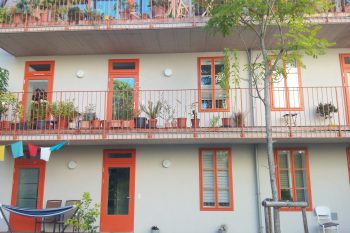Cities4PEDs
Exploring city levers to enable Positive Energy Districts (PEDs) across diverging contexts

Final documents
What is a Positive Energy District?
This report is not a step-by-step guide to developing a PED definition. It is largely aimed not at stakeholders and developers of local districts, but at national, local and European policy makers and researchers: It discusses the different aspects and approaches to PED definition from a theoretical perspective and highlights the challenges and requirements for bridging the gap to a practical and operational definition. It provides insights into three areas of transnational PED definition development:
Firstly, the threats and challenges of PED definition are observed, identified problems are reframed and possible opportunities and solutions for the definition development process are presented: It may indeed be useful to start with the question: “What are the goals of a definition?” and have a differentiated framework that allows for regional differences in the operationalisation of the resulting assessment.
Secondly, the resulting consensus on a common PED definition within the Cities4PEDs project is presented. This includes the use of a positive primary energy balance and the definition of system boundaries, as well as a discussion of different and still open aspects of the definition.
Thirdly, the report looks at how a possible national implementation and operationalisation of the definition can be introduced that meets the identified goals and requirements with a positive primary energy balance and the use of so-called “context factors”. It also gives an insight into what this definition could mean in practice by assessing the CIties4PEDs districts against this definition.
Download the Working Paper here.
For a city to embark on developing a Positive Energy District (PED), the framework conditions, such as political mandate, legal, financial and organisational structures, etc. will have to be in place or established over time. The Cities4PEDs project has investigated the framework conditions for developing PEDs in three cities, Brussels, Stockholm and Vienna and further interesting PED-relevant projects across Europe.
Twenty-five PED-relevant projects were identified by the consortium for further investigation. Out of this list, seven projects were selected for in-depth interviews based on their holistic approach to sustainability at large but in particular, their relevance from a PED perspective. The investigations have been analysed and a multidisciplinary overview of the different aspects of concern for the realization of PEDs has been developed. This PED Atlas is a documentation of the process, the known framework conditions and PED elements.
Download the PED Atlas here.
Cities have diverse modes of energy production and supply. A different distribution of competences in the internal organisation of the city administration and between different levels of governance. Different geographical conditions. The challenges they face when it comes to PED implementation are very diverse. So are the cities’ instruments suitable to address PED-related problems.
In this working paper you will discover:
- Examples of city instruments and steering approaches to govern PED development. These are systematised and categorised from a regulatory perspective.
- Specific city challenges regarding PED development in the Cities4PEDs partner cities and promising approaches to tackle them:
- Enabling energy sharing cross-property
- Transferring sustainability criteria to district developers
- Providing support schemes and systems
- Encouraging knowledge transfer and interdepartmental collaboration
- Closing organisational gaps on district level
Download the Working Paper here
In order to become a PED, measures which have major implications for local communities need to be taken. These will have a profound impact on our daily lives: the way we live, consume and organise ourselves. The public authorities cannot organise these major changes all by themselves and therefore need to reach out to local communities and citizens. They already do so through different channels: [online] surveys, public consultations, digital forums, citizen assemblies, pilot projects, public-private partnerships, etc..
But how inclusive, efficient and successful are these practices? Do all methods fit local communities’ needs or do they neglect them? How to reach diverse key audiences and make sure everyone gets on board? How to move towards co-ownership within PEDs?
In this working paper you will find out:
- How to identify and understand the main “neighbourhood dynamics” (= structures, the history of the neighbourhood, cultures, local actors, established processes at work in neighbourhoods) and analyse needs and challenges for every neighbourhood.
- How to identify different elements (strategies, tactics and tools) that can suit these different contexts and help PEDs to be more inclusive, increasing buy-in from a diverse community.
Download the Working Paper here
Working Paper: Monitoring
The transformation to a Positive Energy District (PED) will require a wide range of measures, including technological, spatial, regulatory, financial, legal, social and economic, to achieve climate goals while providing a good quality of life for all. To keep track of all these different facets and to measure progress, a monitoring system is needed to steer towards a PED. It is crucial that this monitoring system is functional to the achievement of the PED goal, otherwise monitoring will just add more terabytes to the ever-growing pile of data.
In this working paper you will explore
- A monitoring framework that captures the multifaceted characteristics of a PED and allows for strategic steering.
- A catalogue of relevant indicators that could be used in districts aspiring to become PEDs.
- The practical implementation of this monitoring framework and indicators in three cities – Brussels, Stockholm and Vienna.
Download the Working Paper here
Key events
Are you developing Positive Energy Districts (PED)? Are you working on neighbourhoods’ regeneration to decarbonise buildings and improve quality of life? Join us to discuss the methodology developed by the Cities4PEDs’ partners to make sure to ask yourselves the key questions at the adequate time. This is key to ensure progress along a too-often complicated journey. During this interactive workshop, you will learn how the methodology has been applied in Vienna as a case study and you will share your own approach.
Whatch the event recording here.
The cities of Brussels, Vienna and Stockholm, with local partners, are investigating how to implement the Positive Energy District (PED) concept in cooperation with local actors and which new tools should be developed for this purpose. District development and transformation cases have been examined, throughout a series of interviews. From these, instruments, local neighbourhood dynamics and governance models have been distilled and specific strategies have been developed further together.
In light of this first investigation, the project partners would like to open up the conversation around PED implementation strategies, by bringing to the fore an overview of lessons learned from the interviewed districts, and their recurring challenges and bottlenecks in relation with their different strategies. Then, we will explore with participants the development of new instruments and components (organisational structure, tools, energy systems and modus of collaboration) to achieve this pivotal ambition.
Watch the event recording here!
Watch the event recording here
Watch the event recording here
Watch the event recording here
Watch the event recording here
Watch the event recording here
Articles

From Stockholm and Brussels to Vienna: a multidisciplinary team co-developed a strategy to reach ambitious energy targets in three Viennese districts (3 October 2022)

Scaling up Positive Energy Districts across Europe (6 April 2022)

Exploring barriers and levers to decarbonise heating and cooling systems (3 January 2022)


